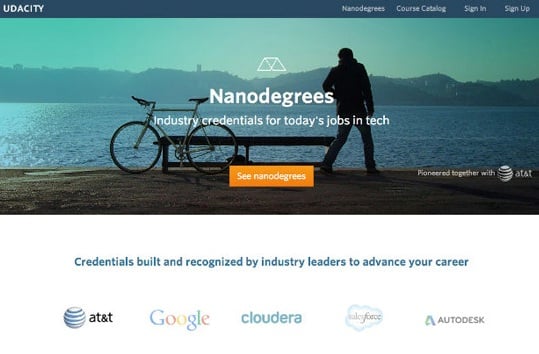The growing importance of alternative credentials
The emergence of non-traditional qualifications - also know as alternative credentials - has changed the higher education landscape in recent years, impacting curriculum delivery and posing a challenge to traditional institutional business models. Yet what are these alternative credentials, and how are they being used? What are the downstream implications for students and institutions? According to Dr Michelle Weise, a leading expert on disruptive innovation in higher education, alternatives to the traditional full-time, on-campus, four-year degree programme are growing. “Fewer and fewer students can afford that option,” she says.
“What's more, 42% of college and university students in 2020 will be over the age of 25. More and more young people want their education to be flexible, inexpensive and oriented toward job opportunities.”
It is this focus on flexibility and employability that distinguishes alternative credentials from traditional forms of education. For Dr Weise, lifelong learning will soon become the new norm, requiring students to work during their studies and to constantly learn new skills to keep up with the demands of a changing job market. Students of tomorrow, she predicts, will design their own curricula and pair it with paid work, internships, opportunities abroad, certificates, and mini degrees obtained online or from niche providers.
“Part of the disjunction is that we have a system that is very linear and insular - one that punishes students who get off-track at any point. Non-traditional students need much more flexibility in terms of what the college experience offers to them. The thing that’s missing in higher education is a way to integrate the idea that there is more to upward mobility than a degree,” she says.
For Dr Weise, certificates or alternative credentials provide a better indication of whether someone has acquired specific skills, which explains why there has been a shift towards competency-based education with measurable outcomes. And while many of what she calls the “elite brands” of higher education are resisting the shift, others are taking note. The Massachusetts Institute of Technology (MIT), for example, released a report in 2014 aimed at exploring the future of education. The report acknowledges the need for increased flexibility in completing a degree and implies steps must be taken to increase accessibility in general.
In the future, says the report, “the very notion of a ‘class’ may be outdated.” Instead, education downstream may involve a variety of certifications, minors, and alternative credentials, instead of a traditional four-year degree. For more traditional students, the future degree may involve multiple Massive Open Online Courses (MOOCs) or community college courses, with a subsequent focus on experiential learning. All of these changes, Dr Weise suggests, are driven by a demand for economic relevance. Elite brands will compete with niche or alternative providers who are able to solve what she sees as essentially a “human capital” problem – matching the skills of graduates with the evolving needs of the job market.
“When we think about the shifting value proposition of higher education, we have to think about what job it is that higher education is being hired to do in students’ lives. For many of these non-traditional students, it really is going to come down to job prospects. The important thing here is to realise that many students are looking to higher education to help them get a job.”
Recognising that prospective employers are seeking specific, demonstrable skills, LinkedIn recently launched its Add to Profile for Certifications feature. Dan Shapero, senior product manager at LinkedIn, sees great value to both employers and job seekers in highlighting alternative credentials on the LinkedIn platform.


There are now more than 50 such programmes in the US and around the world, taking in an estimated US$73 million in tuition since 2011.
The top programmes claim to place the vast majority of their graduates into jobs earning just under six figures, filling a need for practical, hands-on skills that traditional college programmes aren’t able to deliver. According to Anne Spalding, director of Dev Bootcamp in San Francisco, such programmes offer “a chance to think about education in a different way.” The role of teachers, she explains, shifts from being “the sole source of knowledge” to “creating a guided learning environment where knowledge comes from everyone and is shared by everyone.” Coder camps are poised to grow significantly in the coming years by offering a new business model for for-profit vocational education. Indeed, one of the world’s largest education companies, Kaplan, recently purchased Dev Bootcamp. Not all graduates are singing the praises of such intense, short-term programmes. Dan Gailey started Techendo to collect independent reviews of boot camps after being unable to get verifiable information on job-placement rates from the schools themselves. “It’s really the Wild Wild West of education,” he says. “Some people really loved [their experience], and learned a lot. Some people don’t. They feel like they were taken.” Even Dr Weise feels institutions offering non-traditional degrees need to pay closer attention to the needs of their students. Non-traditional students “are often not surrounded visibly by peers working on the same kinds of projects as they are,” she says. “As such, they need to feel strongly mentored and coached along throughout the process of learning.” Despite these challenges, alternative credentials are big business.
“There’s a US$500 billion industry within post-secondary instruction that deals with alternative marketable credentials, industry certifications, apprenticeships, and professional certifications,” notes Dr Weise.
She says institutions can start exploring options by potentially partnering with employers and building competency-based career pathways for students that don’t necessarily end in a traditional credential or degree. “All institutions of higher education will have to think critically about how they offer learning, justify their costs, and adapt their curricula to the changing needs and demands of students, as well as to our rapidly evolving knowledge economy …. Standing still is not an option.”
Most Recent
-
ICEF Podcast: Together for transparency – Building global standards for ethical international student recruitment Read More
-
New analysis sounds a note of caution for UK immigration reforms Read More
-
The number of students in higher education abroad has more than tripled since the turn of the century Read More


















